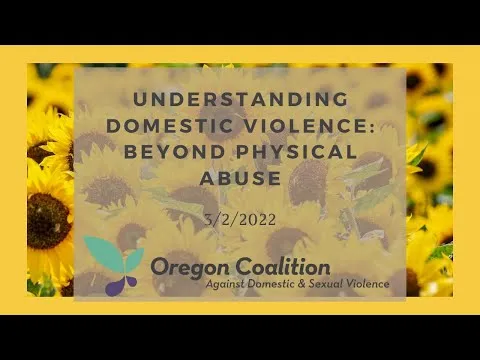
Introduction to Domestic Violence - Online Course 
Discover the shocking reality of domestic violence with this captivating online course. Taught by renowned psychologist and forensic mental health expert, Kevin O'Doherty, this course delves deep into the complexities of this pervasive issue. Gain a comprehensive understanding of the causes, effects, and interventions surrounding domestic violence. With its engaging content and expert guidance, this course is a must for anyone seeking to make a difference in the lives of those affected by this devastating problem. Enroll now on Udemy.com and become an advocate for change. ▼
ADVERTISEMENT
Course Feature
![]() Cost:
Cost:
Free
![]() Provider:
Provider:
Youtube
![]() Certificate:
Certificate:
No Information
![]() Language:
Language:
English
![]() Start Date:
Start Date:
2020-04-29 00:00:00
Course Overview
❗The content presented here is sourced directly from Youtube platform. For comprehensive course details, including enrollment information, simply click on the 'Go to class' link on our website.
Updated in [September 27th, 2023]
We considered the value of this course from many aspects, and finally summarized it for you from two aspects: skills and knowledge, and the people who benefit from it: (Please note that our content is optimized through artificial intelligence tools and carefully reviewed by our editorial staff.) What skills and knowledge will you acquire during this course? During the Introduction to Domestic Violence online course, participants will acquire a range of skills and knowledge related to understanding and addressing domestic violence. Specifically, they will learn about the following: 1. Definition and types of domestic violence: Participants will gain a comprehensive understanding of what domestic violence entails, including its various forms such as physical, emotional, sexual, and financial abuse. 2. Dynamics and impact of domestic violence: The course will explore the underlying dynamics of domestic violence, including power and control dynamics, and the impact it has on victims, families, and communities. 3. Risk assessment and safety planning: Participants will learn how to conduct risk assessments to identify potential dangers and develop safety plans for victims of domestic violence. 4. Legal and ethical considerations: The course will cover the legal and ethical aspects of domestic violence, including reporting obligations, confidentiality, and the role of professionals in addressing domestic violence. 5. Intervention strategies and resources: Participants will be introduced to various intervention strategies and resources available to support victims of domestic violence, including counseling, advocacy services, and community resources. 6. Cultural considerations: The course will address the intersectionality of domestic violence, considering cultural factors that may influence experiences and responses to domestic violence. 7. Self-care and vicarious trauma: Participants will learn about the importance of self-care and strategies to prevent and address vicarious trauma that may arise from working with victims of domestic violence. Who will benefit from this course? This course on Introduction to Domestic Violence will benefit individuals from various backgrounds and professions. 1. Mental health professionals: Psychologists, therapists, counselors, and social workers will gain valuable insights into the dynamics of domestic violence, its impact on victims, and effective therapeutic approaches to address the issue. 2. Law enforcement and legal professionals: Police officers, lawyers, judges, and other professionals working in the criminal justice system will benefit from understanding the complexities of domestic violence cases, including risk assessment, legal procedures, and victim support. 3. Healthcare professionals: Doctors, nurses, and other healthcare providers will learn to recognize signs of domestic violence, provide appropriate medical care, and offer resources for victims. 4. Social workers and advocates: Professionals working in social services and advocacy organizations will gain a deeper understanding of domestic violence, enabling them to provide better support and resources to survivors. 5. Educators and school personnel: Teachers, school counselors, and administrators will learn to identify signs of domestic violence in students and create a safe and supportive environment for those affected. 6. Human resources professionals: HR professionals can benefit from this course to develop policies and procedures that address domestic violence in the workplace, support affected employees, and promote a safe work environment. 7. Community leaders and volunteers: Individuals involved in community organizations, shelters, and support groups can enhance their knowledge of domestic violence to better serve survivors and raise awareness in their communities.
Course Provider

Provider Youtube's Stats at AZClass
Discussion and Reviews
0.0 (Based on 0 reviews)
Explore Similar Online Courses

Cloud Management Training

Domestic Violence Training 2020

Supporting Victims of Domestic Violence - free online course at futurelearncom
![5 Essential Strategies for Your Domestic Violence Defense [2023]](/ccsimg/dcs/img_tools/6751888ccbfc28bd5970424465417fdd.webp)
5 Essential Strategies for Your Domestic Violence Defense [2023]

Domestic Violence Safety Planning training

Coercive Control as Intimate Partner&Domestic Abuse: Understanding the Harm Advocating for Change

WEBINAR: Children Caught in Invisible Chains: Coercive Control Domestic Abuse & Children

Understanding Domestic Violence: Beyond Physical Abuse (Part 1 of 4)

52 - Week Domestic Violence Prevention Classes
![When Domestic Violence Goes Digital [Webinar]](/ccsimg/dcs/img_tools/7acd60f2bda4c66a569e3deb43349f94.webp)

Start your review of Introduction to Domestic Violence - Online Course